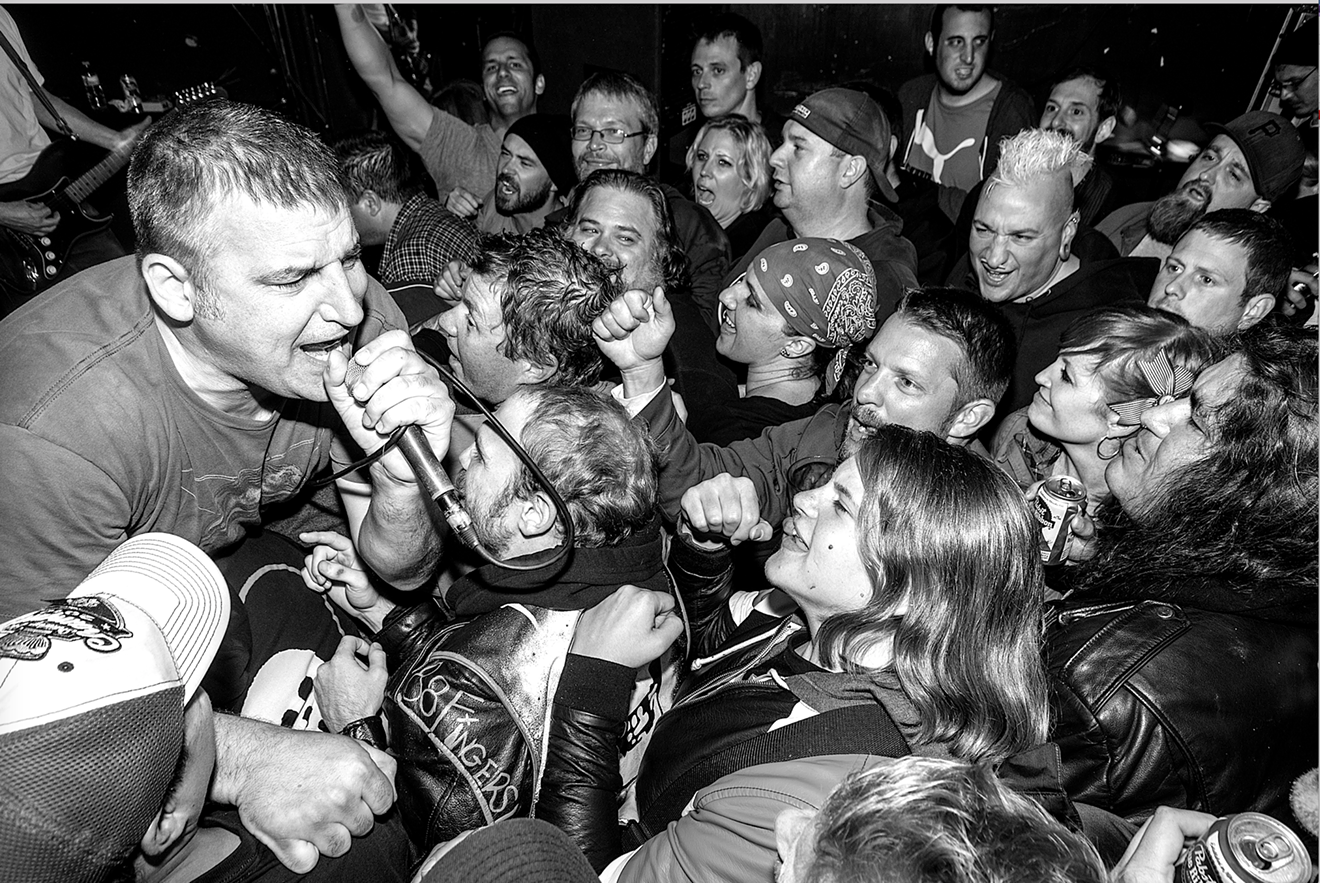Larry Damore played in a new-wave cover band in Chicago throughout most of his teenage years. Like many people growing up in the ’80s, he was inspired by The Decline of Western Civilization, a documentary chronicling Los Angeles’s early punk scene that included bands like Black Flag, the Germs and X.
But while he liked those groups, Damore had no idea that punk was catching on in his town — until one day when he was flipping through radio stations and heard a song by Minor Threat, followed by another by Naked Raygun.
“It just blew me away,” he recalls. “After that, I realized that this kind of music did exist in Chicago.”
In 1985, Damore quit his cover band and formed the punk band Bhopal Stiffs — a cynical nod to the 1984 Union Carbide disaster in India — with four friends. He started frequenting sports bars that hosted late-night hardcore shows in Chicago’s Wrigleyville neighborhood. There he first saw live performances by bands that influenced his own music: Circle Jerks, Hüsker Dü, Black Flag and Minor Threat.
One spot that hosted late-night hardcore shows, the Cubby Bear, was also a sports bar. There was “a weird mixture of jocks — because they were there to watch baseball — and punks,” Damore says.
Unfortunately, the Chicago punk scene of the ’80s was plagued with violence. Damore blames the strife on white supremacy: “I think the real divide then was Nazi skinheads and punks and SHARPs [Skinheads Against Racial Prejudice], to the point where there was a lot of trouble at a lot of shows from the mid- to late ’80s.”
Skinheads, under the spell of a charismatic leader, beat up “longhairs at shows for the hell of it,” he remembers. But when that guy wound up in jail, Chicago’s white-power punk scene imploded.
“I think they lost the momentum they had in the mid-’80s,” Damore says, “and I think that’s about the time punk and hardcore started to break out into the suburbs.”
Youth started congregating at a punk club in Elmhurst called McGregor’s that “really brought punk rock to the kids. It changed the attitude of the scene and made it fun again in a way that was lacking in the inner city,” he says.
Damore formed Pegboy in 1990 — after Nazi violence in the scene had largely subsided — with guitarist John Haggerty, who had played in Naked Raygun, and his brother Joe, the drummer for Bloodsport. Damore had fully embraced a punk identity.
“I thought then, this is what I’m going to be for the rest of my life, and that’s how it turned out. It’s more a lifestyle thing. I’m a 53-year-old punk-rock kid who is still a little bit anti-authority.”
Throughout the ’90s, the band traveled the U.S. in typical punk fashion — on a small scale and mostly in unglamorous circumstances. Over the years, Pegboy collaborated with a respectable slate of musicians, including J. Robbins of Jawbox and Steve Albini.
The group has exerted considerable influence on modern punk rock, as well, despite having little commercial success. While Pegboy didn’t pioneer melodic hardcore, its sound directly impacted younger groups like Rise Against, Hot Water Music and Alkaline Trio.
These days the band, which will play the Don’t Panic Fest on Friday, February 17, tours infrequently, mostly playing around the Chicago area.
For his part, Damore has no regrets about life as a punk: “I met a lot of good friends in the Chicago scene and the national scene, and I wouldn’t trade it for anything.”
Pegboy will play as part of Don’t Panic Fest, which happens Friday and Saturday, February 17 and 18, at various South Broadway venues.
[
{
"name": "Air - MediumRectangle - Inline Content - Mobile Display Size",
"component": "12017618",
"insertPoint": "2",
"requiredCountToDisplay": "2"
},{
"name": "Editor Picks",
"component": "17242653",
"insertPoint": "4",
"requiredCountToDisplay": "1"
},{
"name": "Inline Links",
"component": "18838239",
"insertPoint": "8th",
"startingPoint": 8,
"requiredCountToDisplay": "7",
"maxInsertions": 25
},{
"name": "Air - MediumRectangle - Combo - Inline Content",
"component": "17261320",
"insertPoint": "8th",
"startingPoint": 8,
"requiredCountToDisplay": "7",
"maxInsertions": 25
},{
"name": "Inline Links",
"component": "18838239",
"insertPoint": "8th",
"startingPoint": 12,
"requiredCountToDisplay": "11",
"maxInsertions": 25
},{
"name": "Air - Leaderboard Tower - Combo - Inline Content",
"component": "17261321",
"insertPoint": "8th",
"startingPoint": 12,
"requiredCountToDisplay": "11",
"maxInsertions": 25
}
]












